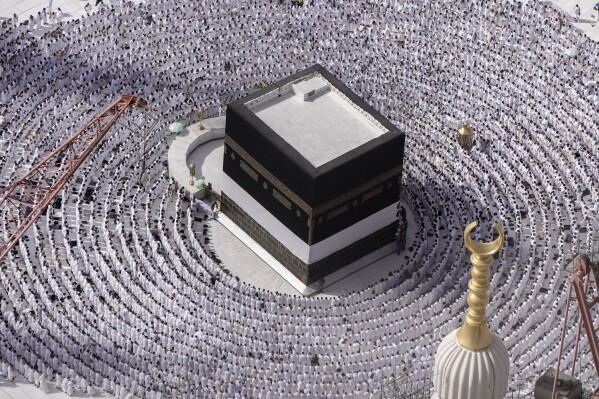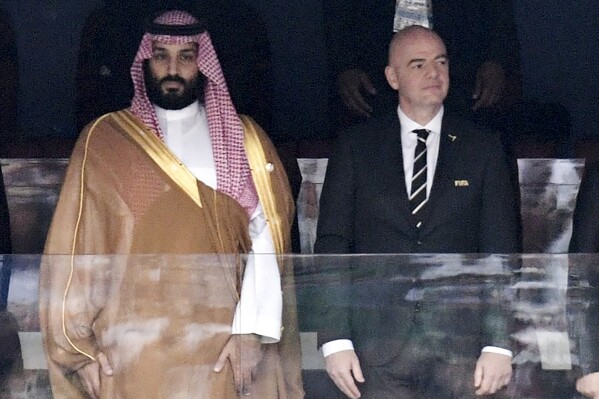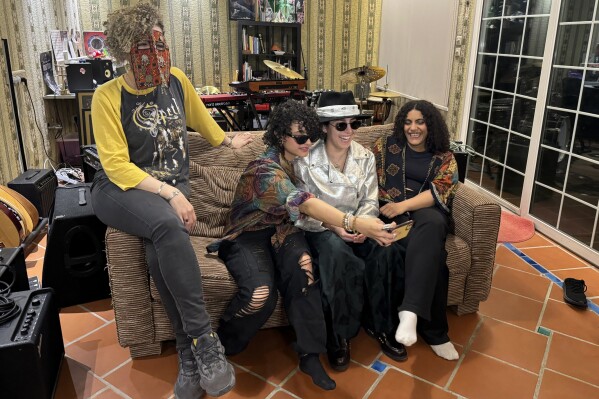Iran says Saudi Arabia has expelled 6 state media journalists ahead of the Hajj after detaining them
DUBAI, United Arab Emirates (AP) — Iran said Wednesday that Saudi Arabia expelled six members of a crew from its state television broadcaster after they had been detained for nearly a week in the kingdom ahead of the Hajj. Saudi Arabia said the men had been working in violation of the visas they received.
The incident comes a year after Riyadh and Tehran reached a Chinese-mediated detente. However, there have been tensions for decades between the Sunni and Shiite powerhouses over the holy sites in the kingdom, particularly around the upcoming Hajj pilgrimage.
Iranian state TV described the arrests as beginning over a week ago when three crew members were detained while recording a Quranic reading at the Prophet Muhammad’s mosque in Medina. It offered no detail about what sparked their detention, but said the men after “several hours of questioning” ended up held at a police detention center.
Two days after that, Saudi police detained a journalist from Iran’s Arabic-language Al Alam channel and another state TV journalist after they got out of a car to attend a prayer service with Iranian pilgrims, state TV said. Another radio journalist was detained at a hotel in Medina.



It said the six men later were released and expelled to Iran without the opportunity to take part in the Hajj, a pilgrimage required of all able-bodied Muslims once in their lives. The expulsion came after efforts by both state TV and Iran’s Foreign Ministry to have the men released. Iranian state TV insisted the men committed no crime and that their detention was unwarranted.
“They were carrying out their normal and routine task when this happened and they were arrested,” said Peyman Jebeli, the head of Iran’s state broadcaster, known as Islamic Republic of Iran Broadcasting. “We are not aware of the reason they were arrested and sent back to the country.”
Saudi Arabia’s Center for International Communication told The Associated Press early Thursday that the Iranians detained had been in the kingdom on visas only allowing them to perform the Hajj, not work as journalists.
They “engaged in activities that are incompatible with the type of visas granted to them in violation of the kingdom’s residency regulations,” the center said.
Both Iran and Saudi Arabia are considered “not free” under rankings by the Washington-based organization Freedom House, with scores of zero in their metric on whether a country has a free and independent press.
Iran, the largest Shiite Muslim country in the world, and Sunni powerhouse Saudi Arabia severed diplomatic ties in 2016 after Saudi Arabia executed prominent Saudi Shiite cleric Nimr al-Nimr. Angry Iranians protesting the execution stormed two Saudi diplomatic missions in Iran.
Last year, Chinese mediation restored ties despite Saudi Arabia still being locked in a yearslong stalemated war with Iranian-backed Houthi rebels in Yemen.
Saudi Arabia had previously severed ties with Iran from 1988 to 1991 over rioting during the Hajj in 1987 and Iran’s attacks on shipping in the Persian Gulf. That diplomatic freeze saw Iran halt pilgrims from attending the Hajj in Saudi Arabia. Iranian pilgrims briefly were stopped from attending Hajj over the most-recent round of tensions as well.
Iran has insisted in the past that its pilgrims be allowed to hold large-scale “disavowal of infidels” ceremonies — rallies denouncing Israel and Saudi ally the United States. Saudi Arabia bans such political demonstrations at Hajj, which is attended by about 2 million Muslims from around the world.
Disclaimer: The copyright of this article belongs to the original author. Reposting this article is solely for the purpose of information dissemination and does not constitute any investment advice. If there is any infringement, please contact us immediately. We will make corrections or deletions as necessary. Thank you.